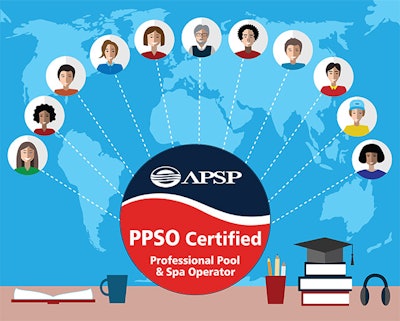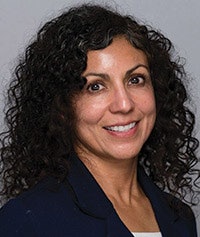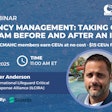
When APSP decided to reintroduce it's shelved PPSO (Professional Pool & Spa Operator) commercial certification program last year, it faced a couple of challenges. It needed money and manpower to update the course, naturally, and the Association had a lot of work to do to spread the word that there was a new way to earn one's stripes as a commercial operator. But what about readying the corps of instructors needed to bring the material to the masses?
AQUA spoke with Silvia Uribe, senior manager of global education and training at APSP, about why the Association brought the course back and how it was identifying and training course instructors. At the time of the interview, the first sessions were less than a month away, but she felt confident the instructors would be more than ready to meet the challenge of teaching fresh-faced industry recruits.
RELATED: Class (Back) In Session
 Silvia Uribe, APSP senior manager of global training and education
Silvia Uribe, APSP senior manager of global training and education
AQUA: Can you talk a little bit about the PPSO program and why you brought it back?
Uribe: One of the reasons we brought the PPSO back is because of requests from people in the industry. There's a real demand for a course geared toward pool operators that will empower them with the skills and training they need to perform their jobs well on the first day. We don't want them to do any guessing or to go back to the textbook to relearn something they didn't really grasp in the first place.
Part of that process involved eliminating some material they didn't really need to know to do their jobs. Other courses have information geared more toward facility operators and throw more at attendees than they need to know. We're changing that and people seem to be excited about it.
AQUA: How have you gone about finding people to teach the course?
Uribe: In order to deliver our course beginning in January, we decided to take an approach to get people ready as quickly as possible, and settled on three ways a candidate could become an instructor. One was to grandfather the status that instructors had 10 years ago when they were certified as PPSO instructors. For the second one, we used the guidelines for the International Association of Directors and Instructors, which allowed us to establish a reciprocity program. What that means is that any instructor with a current teaching certification from any private or public organization that also has three years of experience in aquatics can apply to become an instructor for the PPSO. The third way will be to attend the two-day Train the Trainer program for PPSO. We will announce those courses in March.
AQUA: How many instructors are going to be grandfathered?
Uribe: Currently, I have approximately a dozen under that category, but if you include instructors that were grandfathered and those that were approved through the reciprocity program, we have enough to start the upcoming training season.
Next week, I will be conducting a webinar for both the grandfathered instructors and those who achieved status through reciprocity. In advance we sent them a PowerPoint presentation for the course, an instructor guide, our certification policies and other tools they will need to conduct the training. The webinar will help them become more familiar with those materials and will give them ideas about how to use them while teaching the classes. While they are experts on the technical content already, we want to make them more familiar with the presentation, with the manuals and with the administrative duties that will be required.
AQUA: Where will the reciprocity candidates come from?
Uribe: We have instructors with a variety of backgrounds. Some instructors are teaching pool operator programs for other organizations. We also have some with teaching degrees who now, for one reason or another, find themselves in the aquatics industry. The pool of instructors who qualify through reciprocity is really varied.
AQUA: So that's how the first two sets of instructors are trained. Can you talk about the "Train the Trainer" category?
Uribe: APSP currently has a one-day course called Train the Trainer, or T3, as we call it. It's a basic course to give the instructors-to-be the fundamentals of teaching other APSP courses. For the PPSO, we've created a specific two-day training curriculum. It is called PPSO T3
The focus for the PPSO T3 course is to provide candidates with the fundamentals of teaching adults. We will do an assessment of each candidate's knowledge of the material and their ability to teach that knowledge to adults. If you can't prove that you know the material, sorry, but you can't be an instructor! Students always have questions, and instructors need to know how to answer them.
Prospective instructors have to fill out an application and submit documentation. We will look at all of that before deciding whether to allow them to instruct the course.
AQUA: Are there ongoing evaluations of the instructors?
Uribe: The instructor kits we send include student evaluation forms. Some of the questions on these forms ask the students to grade the instructor. We really care about what kind of reputation the instructor has in the industry and student evaluation forms give us way of measuring their standing and reputation. These evaluation forms are very important to our efforts at keeping the quality of the instructors high when it's time to reauthorize them.
AQUA: You officially introduced the new PPSO program at an event during the Orlando show in November. How did that go?
Uribe: It went very, very well and I was thrilled with the reception and the feedback we got from attendees. We had a roomful and the people that attended had to register ahead of time. You know, sometimes people register for these things and with all that's going on at a trade show and conference, they don't end up attending. Well, not one of the people who registered missed the session. It was very well received. Again, I believe that's because the PPSO certification program was created to meet a current need in the industry. People appreciate what we're doing. We received lots of comments telling us that people were pleased that they would have the option to send employees to this course.
AQUA: Getting back to the nuts and bolts of the program, do instructors sell the course?
Uribe: Instructors will purchase the books from us and pay the certification fee, then set their own price for the students. Instructors pay $35 for the book and $20 for the certification. The price that instructors pay for the book and the certificate is very attractive. Also, we offer financial rewards to instructors to show our appreciation for their effort. We know we can't ever pay them what they really deserve for what they are doing, but we want to offer them a small token of our thanks. They're the soldiers on the ground, and they're doing important work for the industry.
AQUA: By the time this article hits, you'll be ready to begin the Train the Trainer course. Do you have a sales pitch for people who maybe haven't considered being instructors but who might be good candidates?
Uribe: We are looking for people who are passionate about teaching others and sharing the knowledge they have. For us that's imperative, and that's something we look for during screening. We want instructors who really can pass on the background, the knowledge and the experience they have to the new people coming into the industry. Our industry is going through a big change, just like every other industry, with the millennials entering the workforce. We want to identify the people who are passionate about sharing their experience with the new wave of young workers. If those things describe you, you should get in touch with me!
Just this morning a woman who manages over 50 commercial properties in New Jersey contacted me about becoming an instructor. She wants to train her team that's taking care of the properties. For people like her, it's most advantageous to be your own instructor. That way she doesn't need to send 50 people every year for training — there's a lot of turnover in these seasonal positions. If she becomes an instructor, she can train her own staff, and save money.
AQUA: How many instructors do you think you need?
Uribe: Nobody's ever asked me how many instructors we need, but I've asked myself that same question! First of all, it's more than just numbers. We want instructors that are knowledgeable and pass along that knowledge. But how many? I really can't give you an exact number, but our goal is to have instructors in every state to cover people's needs. With 31 APSP chapters all over, with the team of instructors we already have, and the ones to come, we know there are going to be enough professionals that are qualified to teach our courses.
AQUA: Where can people who want to take the certification course find more info?
Uribe: People interested in taking the PPSO class can go and visit www.apsp.org/ppsocourses for dates and locations. We currently have about 90 classes scheduled, and we'll be adding more. There's a map on the site so people can identify the nearest location. No one has to go that far to take the course, and as more are added the distance to a person's nearest course will shrink even further.
Comments or thoughts on this article? Please e-mail [email protected].





































